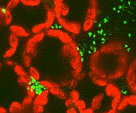Plant Pathology, Department of

Department of Plant Pathology: Faculty Publications
Document Type
Article
Date of this Version
2014
Citation
Fernandez J, Marroquin-Guzman M, Wilson RA (2014) Evidence for a Transketolase-Mediated Metabolic Checkpoint Governing Biotrophic Growth in Rice Cells by the Blast Fungus Magnaporthe oryzae. PLoS Pathog 10(9): e1004354. doi:10.1371/journal.ppat.1004354
Abstract
The blast fungus Magnaporthe oryzae threatens global food security through the widespread destruction of cultivated rice. Foliar infection requires a specialized cell called an appressorium that generates turgor to force a thin penetration hypha through the rice cuticle and into the underlying epidermal cells, where the fungus grows for the first days of infection as a symptomless biotroph. Understanding what controls biotrophic growth could open new avenues for developing sustainable blast intervention programs. Here, using molecular genetics and live-cell imaging, we dismantled M. oryzae glucose-metabolizing pathways to reveal that the transketolase enzyme, encoded by TKL1, plays an essential role in facilitating host colonization during rice blast disease. In the absence of transketolase, Dtkl1 mutant strains formed functional appressoria that penetrated rice cuticles successfully and developed invasive hyphae (IH) in rice cells from primary hyphae. However, Dtkl1 could not undertake sustained biotrophic growth or cell-to-cell movement. Transcript data and observations using fluorescently labeled histone H1:RFP fusion proteins indicated Dtkl1 mutant strains were alive in host cells but were delayed in mitosis. Mitotic delay could be reversed and IH growth restored by the addition of exogenous ATP, a metabolite depleted in Dtkl1 mutant strains. We show that ATP might act via the TOR signaling pathway, and TOR is likely a downstream target of activation for TKL1. TKL1 is also involved in controlling the migration of appressorial nuclei into primary hyphae in host cells. When taken together, our results indicate transketolase has a novel role in mediating - via ATP and TOR signaling - an in planta-specific metabolic checkpoint that controls nuclear migration from appressoria into primary hyphae, prevents mitotic delay in early IH and promotes biotrophic growth. This work thus provides new information about the metabolic strategies employed by M. oryzae to enable rice cell colonization.


Comments
Copyright 2014 Fernandez et al. This is an open-access article distributed under the terms of the Creative Commons Attribution License.